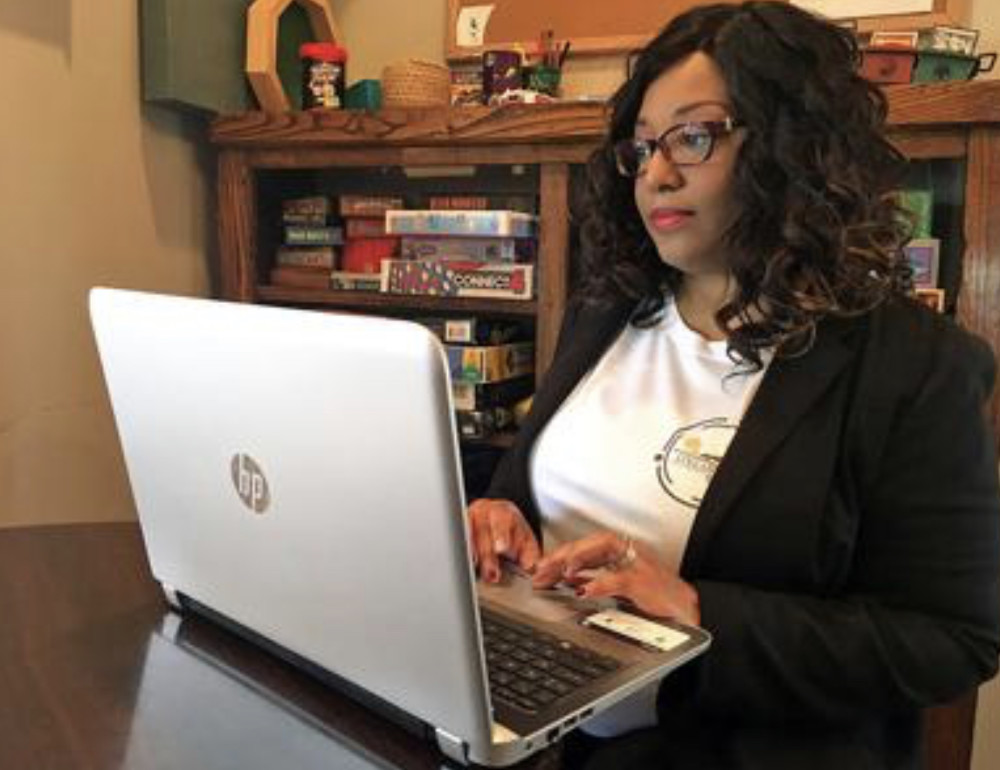By Jason Thomas,
The Evening News and the Tribune
WWR Article Summary (tl;dr) LaQuesha Harris is the founder of “Collabo Village”, an app that contains a directory of more than 250 black-owned business in Southern Indiana and Louisville. The app also serves as a hub for people to connect and exchange professional opportunities and contacts.
JEFFERSONVILLE
Over a 16-month span, Jeffersonville resident LaQuesha Harris immersed herself in the complex world of mobile technology, even dabbling in coding tools, to fulfill her vision.
At the end of her journey was a new beginning: an app called Collabo Village that serves as a one-stop shop to unify black-owned business and services, as well as act as a portal for minority news and cultural events.
“I just saw there was a need, and technology is a big part of our lives these days, and for it be at the palm of our hands is a really big deal,” Harris, 36, said of her invention. “I thought about it, and it just took off from there.”
Collabo Village, available for free at Google Play and Apple App stores, contains a directory of more than 250 (and growing) black-owned business in Southern Indiana and Louisville, ranging from beauticians to auto mechanics to mental health services. The app also serves as a clearinghouse for job opportunities for minority business.
“But it doesn’t stop there,” Harris said. “Any job offer that’s available in Louisville and Southern Indiana can be posted there.”
The app also features listings for cultural events and news, especially success stories about black-owned businesses.
“I recently saw a post where a black woman has her own trucking company out of Atlanta,” Harris said. “Maybe it’ll inspire someone.”
Harris, an office coordinator at Ivy Tech Community College-Sellersburg, had never ventured into entrepreneurism, especially with a technological focus, before taking the leap to create Collabo Village. She saw black-owned business and services scattershot on Facebook, and realized the need for an app that would centralize everything into one location accessible with the tap of a finger.
“Facebook is a great tool for our generation,” Harris said. “We tend to utilize that a lot for anything we might be looking for. The app was designed specifically for the black community. Anyone can use it, but just the information that we may be looking for that may not be readily available, we have to search for it.
“I believe because it hadn’t been mobile in the past people really didn’t know where to go to find what they were looking for.”
Her journey to create the app — it launched on June 19, intentionally set for Juneteenth, which is a holiday that commemorates the emancipation of slavery — has sparked a new interest in Harris.
“It actually has inspired me, since I am an employee at Ivy Tech, to maybe take some classes on coding,” said Harris. “I had never done anything like that before.”
During her development of the app, Harris discovered a study that revealed if middle class African-Americans spent at least 10 percent of their income weekly in the black community, it would generate more jobs. That statistic inspired Harris to eventually roll out a weekly event called Black Friday, in which she will interview a black-owned business owner “to get the word out,” she said.
Resources for black-owned businesses in Southern Indiana seem to be scarce.
The Indiana Economic Development Corp. offers programs and partnerships to support entrepreneurs, including the Small Business Development Center (SBDC) and the Procurement Technical Assistance Center.
Of the 318 new business starts in 2018 under the SBDC, seven of them were from either Clark or Floyd County. Of those new businesses, 19 percent were minority owned, but none of them were located in either Clark or Floyd County.
According to Suzanne Ruark, marketing director at One Southern Indiana, the chamber does not segment its businesses by race. In the past, 1si held a women and minority business owner’s conference “but the popularity and sponsorship dwindled to almost nothing,” Ruark stated in an email.
Which is why Collabo Village could find a niche. After starting the business directory on her app, Harris realized she had barely begun to scratch the surface on the number of black-owned businesses in Southern Indiana and Louisville.
“If we could just get the word out, then we’ll be thriving,” Harris said. “There’s already so much black excellence that already exists in this area. If we could all work together and thrive — that’s why I call it Collabo Village — if we could all collaborate and be a village for one another, then we could all thrive.”
___
Distributed by Tribune Content Agency, LLC.














































































































































































































































































































































































